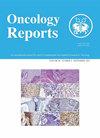Salidroside inhibits the growth of human breast cancer in vitro and in vivo.
Abstract
Salidroside has been identified as one of the most potent compounds isolated from the plant Rhodiola rosea, and was found to have several important biological properties, including antioxidant and anti-inflammatory activity; however, its anticancer effects are poorly understood. Thus, the present study focused on evaluating the effects of purified salidroside on the growth of human breast cancer in vitro and in vivo, and on further investigating its possible molecular mechanisms. The human breast cancer cell line, MCF-7, was incubated with various concentrations of salidroside, and cell proliferation, colony formation, cell cycle distribution, apoptosis, migration and invasion were assayed by several in vitro approaches. As a result, it was found that salidroside treatment significantly inhibited cell proliferation, colony formation, migration and invasion, as well as induced cell apoptosis and cell cycle arrest at the G0/G1 phase in vitro. In addition, we also evaluated the effect of salidroside on tumor growth in a nude mouse model, and found that salidroside treatment significantly suppressed tumor growth in vivo. We also further disclosed that salidroside treatment significantly inhibited the intracellular reactive oxygen species (ROS) formation and MAPK pathway activation, which may contribute to the inhibition of tumor growth of breast cancer and reduction of oxidative stress. In conclusion, these findings suggest that salidroside may be a promising candidate target for the prevention and treatment of human breast cancer.





